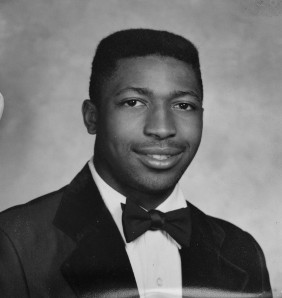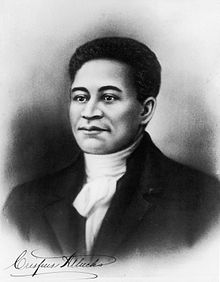Difference between revisions of "Eric Garner"
(Created page with "Eric Garner was a black man who suffered mortal trauma at the hands of New York City police. He seems to have been a decent, respectable person, with an entrepreneurial bent....") |
|||
| (3 intermediate revisions by the same user not shown) | |||
| Line 1: | Line 1: | ||
Eric Garner was a black man who suffered mortal trauma at the hands of New York City police. He seems to have been a decent, respectable person, with an entrepreneurial bent. His case is morally ambiguous in several ways, but there are some interesting lessons to be drawn from Garner's untimely demise. | Eric Garner was a black man who suffered mortal trauma at the hands of New York City police. He seems to have been a decent, respectable person, with an entrepreneurial bent. His case is morally ambiguous in several ways, but there are some interesting lessons to be drawn from Garner's untimely demise. | ||
| − | The police attempted to arrest Garner for tax evasion. They had a legal duty to secure his physical arrest; just leaving him alone (as he repeatedly, politely requested) was not a legal option. Garner proved a strong-willed and formidable adversary, requiring the efforts of four burly officers to subdue him. He continued to resist arrest until he lost consciousness. In the course of the conflict Garner tried, quite reasonably, to play on the officers' human sympathies by complaining he could not breathe. But he also continued to resist, and human sympathies do not override police officers' legal duties. | + | The police attempted to arrest Garner for tax evasion (specifically, selling cigarettes from a pack without a tax stamp). They had a legal duty to secure his physical arrest; just leaving him alone (as he repeatedly, politely requested) was not a legal option. Garner proved a strong-willed and formidable adversary, requiring the efforts of four burly officers to subdue him. He continued to resist arrest until he lost consciousness. In the course of the conflict Garner tried, quite reasonably, to play on the officers' human sympathies by complaining he could not breathe. But he also continued to resist, and human sympathies do not override police officers' legal duties. |
| − | Once Garner was incapacitated and cuffed, the officers rolled him over to ease his breathing. They had a legal duty to do this; police officers are trained in the dangers of "positional asphyxia" which is when a fat person suffocates because they are lying handcuffed and prone. Garner seemed to be breathing when taken to hospital. He died about an hour later, apparently of a heart attack brought on by the struggle. | + | Once Garner was incapacitated and cuffed, the officers rolled him over to ease his breathing. They had a legal duty to do this; police officers are trained in the dangers of "positional asphyxia" which is when a fat person suffocates because they are lying handcuffed and prone. One officer urged Garner to breathe. Garner seemed to be breathing when taken to hospital. He died about an hour later, apparently of a heart attack brought on by the struggle. There was no way for anyone involved to have known Garner was at particular risk of a heart attack. |
Eric Garner would have lived if any of the following had obtained: | Eric Garner would have lived if any of the following had obtained: | ||
| Line 14: | Line 14: | ||
Note that a major motivation for American independence and the bloody Revolutionary War which followed, was tax stamps. Eric Garner would have been right at home in the American Revolution. | Note that a major motivation for American independence and the bloody Revolutionary War which followed, was tax stamps. Eric Garner would have been right at home in the American Revolution. | ||
| + | |||
| + | [[File:garner.jpg||Eric Garner]][[File:220px-Crispus Attucks.jpg||Crispus Attucks]] | ||
| + | |||
| + | Eric Garner and Crispus Attucks in better days | ||
Latest revision as of 14:35, 29 May 2016
Eric Garner was a black man who suffered mortal trauma at the hands of New York City police. He seems to have been a decent, respectable person, with an entrepreneurial bent. His case is morally ambiguous in several ways, but there are some interesting lessons to be drawn from Garner's untimely demise.
The police attempted to arrest Garner for tax evasion (specifically, selling cigarettes from a pack without a tax stamp). They had a legal duty to secure his physical arrest; just leaving him alone (as he repeatedly, politely requested) was not a legal option. Garner proved a strong-willed and formidable adversary, requiring the efforts of four burly officers to subdue him. He continued to resist arrest until he lost consciousness. In the course of the conflict Garner tried, quite reasonably, to play on the officers' human sympathies by complaining he could not breathe. But he also continued to resist, and human sympathies do not override police officers' legal duties.
Once Garner was incapacitated and cuffed, the officers rolled him over to ease his breathing. They had a legal duty to do this; police officers are trained in the dangers of "positional asphyxia" which is when a fat person suffocates because they are lying handcuffed and prone. One officer urged Garner to breathe. Garner seemed to be breathing when taken to hospital. He died about an hour later, apparently of a heart attack brought on by the struggle. There was no way for anyone involved to have known Garner was at particular risk of a heart attack.
Eric Garner would have lived if any of the following had obtained:
- The police had not deemed him an important enough criminal to be worth their time.
- He had submitted to arrest willingly, or realized sooner that his continued resistance might well mean the loss of his life.
- He hadn't been suspected of tax evasion in the first place. That is to say, if the City of New York did not require a tax stamp on cigarettes sold in the city.
That last point should be carefully considered by people who jumped to the conclusion that this was a simple case of police brutality. Those exact same people tend to be the kinds of people who favor taxation of vices and luxuries such as tobacco. It does seem rather absurd that a fellow met his end for allegedly selling cigarettes.
Note that a major motivation for American independence and the bloody Revolutionary War which followed, was tax stamps. Eric Garner would have been right at home in the American Revolution.
Eric Garner and Crispus Attucks in better days

